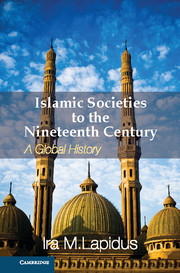Book contents
- Frontmatter
- Contents
- List of Illustrations
- List of Figures
- List of Maps
- List of Tables
- Preface
- Acknowledgments
- Acknowledgments to the first edition of A History of Islamic Societies
- Acknowledgments to the second edition of A History of Islamic Societies
- Publisher's Preface
- Introduction to Islamic Societies
- Part I The Beginnings of Islamic Civilizations
- The Middle East from c. 600 TO c. 1000
- The Preaching of Islam
- Chapter 2 Historians and the Sources
- Chapter 3 Arabia
- Chapter 4 Muhammad: Preaching, Community, and State Formation
- The Arab-Muslim Imperium (632–945)
- Cosmopolitan Islam: The Islam of The Imperial Elite
- Urban Islam: The Islam of Scholars and Holy Men
- Women, Families, and Communities
- Part II From Islamic Community to Islamic Society
- Part III The Global Expansion of Islam from the Seventh to the Nineteenth Centuries
- Glossary
- Bibliography
- Annotated Bibliography from A History of Islamic Societies, 2nd Edition
- Index
Chapter 2 - Historians and the Sources
Published online by Cambridge University Press: 05 February 2013
- Frontmatter
- Contents
- List of Illustrations
- List of Figures
- List of Maps
- List of Tables
- Preface
- Acknowledgments
- Acknowledgments to the first edition of A History of Islamic Societies
- Acknowledgments to the second edition of A History of Islamic Societies
- Publisher's Preface
- Introduction to Islamic Societies
- Part I The Beginnings of Islamic Civilizations
- The Middle East from c. 600 TO c. 1000
- The Preaching of Islam
- Chapter 2 Historians and the Sources
- Chapter 3 Arabia
- Chapter 4 Muhammad: Preaching, Community, and State Formation
- The Arab-Muslim Imperium (632–945)
- Cosmopolitan Islam: The Islam of The Imperial Elite
- Urban Islam: The Islam of Scholars and Holy Men
- Women, Families, and Communities
- Part II From Islamic Community to Islamic Society
- Part III The Global Expansion of Islam from the Seventh to the Nineteenth Centuries
- Glossary
- Bibliography
- Annotated Bibliography from A History of Islamic Societies, 2nd Edition
- Index
Summary
For more than a century, Western scholarship on the “origins” of Islam – Arabia, the life of Muhammad, the Quran, and the Arab conquests – was based on the traditional Arabic sources. Western scholars added commentaries on themes important in Anglo-European historiography such as the psychology of the Prophet Muhammad, the social and economic environment, and the relationships of early Islam to Judeo-Christian and Arabian cultures. The theme of political and religious leadership was particularly prominent.
In recent decades an intensive reexamination of the Arabic sources has challenged the traditional narratives. A number of scholars have argued that we do not and cannot know much about the early Islamic era. Every aspect of the “origins” of Islam – the paganism of Arabian society, the advent of the Prophet Muhammad, the provenance of the Quran, and the story of prophecy, community, and state formation in early seventh-century Arabia, and many aspects of the Arab conquests – has become the subject of scholarly controversy. The skeptics point out that the sources did not begin to be transcribed from oral to written form until a century or so after Muhammad's death. Texts in hadith, law, theology, and history were not compiled in written form until the late seventh century, when oral reminiscences began to be written down, scraps of documents collected, stories assembled, biographies remembered, exploits celebrated, and chronologies worked out, decades and even a century after the events in question. These materials were not organized into books until the middle decades of the eighth century and often as late as the ninth century. The historical record could not but be shaped by later political, social, and religious commitments; factional, tribal, sectarian, and ethnic rivalries; the interests of caliphs and scholars; and the competition among elites for political and religious authority.
- Type
- Chapter
- Information
- Islamic Societies to the Nineteenth CenturyA Global History, pp. 26 - 30Publisher: Cambridge University PressPrint publication year: 2012



